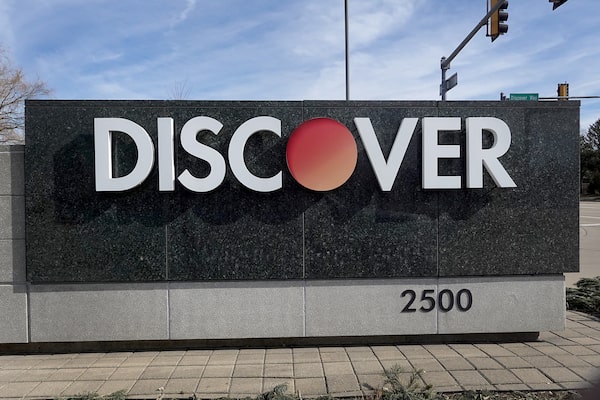
A sign outside the entrance of the Discover Financial Services corporate headquarters campus, in Riverwoods, Ill., on Feb. 19.Scott Olson/Getty Images
Capital One Financial Corp.’s COF-N $35.3 billion deal for Discover Financial DFS-N would create new competition for payments behemoths Visa Inc. V-N and Mastercard Inc. MA-N, potentially helping smoothen the path for regulatory approval, analysts said.
The all-stock deal announced on Monday would create the biggest U.S. credit card issuer, but it would also give Capital One access to Discover’s payment network, allowing it to rely less on payments giants Visa and Mastercard.
With some lawmakers having accused Visa and Mastercard of a “duopoly,” Capital One’s promise to boost payment competition will be key as it begins to navigate political and regulatory hurdles in coming months, including from bank agencies and potentially the Justice Department, analysts said.
“This potential deal could ultimately secure regulatory approval, but it would face galeforce headwinds from a Washington that is deeply skeptical of consolidation,” Isaac Boltansky, director of policy research for brokerage BTIG, wrote in a note. However, he added: “There are some in Washington who are wary of Visa and Mastercard’s duopoly, which suggests that bolstering a competitor … could be viewed positively.”
Capital One CEO Richard Fairbank said on Tuesday the deal – the biggest in the global credit card industry, according to Dealogic – was “well-positioned for approval” and the lenders had kept regulators informed, although he did not provide details on the discussions. They will file formal paperwork with regulators in the next couple of months, he said.
Visa shares closed down 1.2% on Tuesday, while shares of Mastercard, which has a bigger exposure to Capital One, ended down 3.5%.
Still, Democratic U.S. Senator Elizabeth Warren, a big bank critic, said in a social media post that the deal would harm financial stability and reduce competition. “Regulators must block it immediately,” she wrote on X, formerly known as Twitter.
Some community groups, who have the power to slow bank deals by lodging formal objections, also criticized the merger. Jesse Van Tol, CEO of the National Community Reinvestment Coalition, said Capital One’s plan to integrate its card lending with Discover’s network “poses massive antitrust concerns.”
Investors hedged their bets on the deal’s completion.
Discover shares traded at around $125 on Tuesday afternoon, a steep discount to the $140-per-share valuation the all-stock deal implies. Using Discover’s $110.49 Friday closing price as a yardstick, the spread shows investors are assigning only a 50% chance to the deal being completed.
William Nygren, U.S. chief investment officer at Harris Associates, one of Capital One’s biggest investors, said the firm liked the deal and believed it would go through.
“It forces Visa and Mastercard to operate in a more competitive environment,” he said. The new company would be more similar to American Express, which is both a credit card lender and a network company, and trades at a higher multiple, Nygren added.
The Federal Reserve and Office of the Comptroller of the Currency, which must approve the deal, did not provide comment. The Consumer Financial Protection Bureau, which last week flagged concerns over competition in the credit card market, declined to comment.
The combination of Capital One and Discover would create the biggest U.S. credit card issuer with around $250 billion in card balance and a market share of 22%, according to TD Cowen analysts.
Capital One, the third-largest issuer of Visa and MasterCard credit cards in the United States, said shifting its card portfolio from those two payment giants to Discover’s network would help it generate $1.2 billion in 2027.
Any transition, however, would likely be slow since both Visa and Mastercard renewed their partnerships with the company recently, said J.P. Morgan analyst Tien-tsin Huang.
A Mastercard spokesperson said Capital One’s partnership with Mastercard “will continue for the long-term.”
Visa did not immediately respond to requests for comment.
Shares of Discover ended up 12.6% at $124.42 on Tuesday, inching closer to the offer price of $139.86 after opening at their highest level in nearly two years. Capital One started the day down roughly 5%, but closed almost flat.
“Given the vast savings in operational costs expected … Capital One believes complex regulatory hurdles are worth being navigated to deliver significant returns,” said Susannah Streeter, head of money and markets at Hargreaves Lansdown.